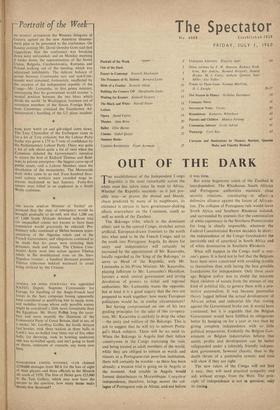OUT OF THE DARK 'TINE establishment of the Independent Congo
j_ Republic is the most remarkable action the white man has. taken since he went to Africa. Whether the Republic succeeds—as it just pos- sibly may--or proves the dismal and bloody chaos predicted by many of its neighbours, its existence is certain to have government-shaking effects everywhere on the Continent, south as well as north of the Zambesi.
The Bakongo tribe, which is the dominant ethnic unit in the central Congo, stretches across artificial, European-drawn frontiers to the north into what used to be the French Congo, and to the south into Portuguese Angola. Its desire for unity and independence will certainly be increased by the appointment of Mr. Kasavubu, locally regarded as the 'king of the Bakongo,' to serve as Head of the Republic, with Mr. Lumumba as his Prime Minister. Mr. Kasavubu, playing Jefferson to Mr. l.umumba's Hamilton, favours a weak central government and strong devolution of powers to tribal and regional authorities; Mr. Lumumba wants the opposite; but at least it is a good augury that the two are prepared to work together; how many European politicians would be, in similar circumstances?
But having compromised on one of his two guiding principles for the sake of this co-opera- tion, Mr. Kasavubu is unlikely to drop the other —the unity and welfare of the Bakongo. This is not to suggest that he will try to subvert Portu- gal's black subjects. There will be no need to. When the Bakongo in Angola find their fellow countrymen in the Congo exercising the vote, and being treated as adult members of the world, while they are obliged to remain as wards and minors in a Portuguese-run poor=law institution, there will certainly be trouble—as there has been already; a treason trial is going on in Angola at the moment. And trouble in Angola would foment disturbances in Mozambique. Congolese independence, therefore, brings nearer the col- lapse of Portuguese rule in Africa; and not before
it was time.
But white hegemony south of the Zambesi is interdependent. The Rhodesian, South African and Portuguese authorities maintain close security relations, constituting---in effect—a defensive alliance against the forces of African- ism. The collapse of Portuguese rule would leave South Africa and Southern Rhodesia isolated, and surrounded by enemies (for the continuation of white supremacy in the Northern Protectorates for long is clearly impossible, whatever the Federal Constitutional Review decides). In short: the independence of the Congo foreshadows the inevitable end of apartheid in South Africa and of white domination in Southern Rhodesia.
What will happen in the Congo itself is any- one's guess. It is hard not to feel that the Belgians have been more concerned with avoiding trouble to themselves than with laying the best possible foundations for independence. Only three years ago Belgian policy was to shield the innocent black children of nature from the stresses of any kind of political life; to govern them with a pro- tective paternalism. It was because paternalist theory lagged behind the actual development of African urban and industrial life that rioting against the Government broke out. It would have continued; but it is arguable that the Belgian Government would have fulfilled its obligations better by hanging on for a year or two than by giving complete independence with so little political preparation. Evidently the Belgian Gov- ernment or Belgian industrialists believe that assets. profits and development can be better safeguarded under a tolerably friendly indepen- dent government, however chaotic, than in the death throes of a paternalist system; and time will show if they are right.
The new rulers of 'the Congo will not find it easy; they will need practical sympathy and aid,. without strings, from the West. The prin- ciple of independence is not in question; only its timing.


























































 Previous page
Previous page